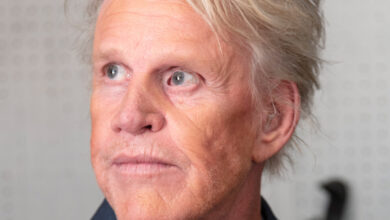In New York, Hochul Says State of the State Is Concerning, but Fixable

Gov. Kathy Hochul on Tuesday presented a stark view of New York’s challenges, highlighting crime, a failing mental health infrastructure and affordability concerns as vexing problems that her administration was ready to tackle.
In her annual State of the State address, Ms. Hochul, a Democrat from Buffalo, trumpeted her administration’s investments in child care, education and infrastructure, pledging that a “new day was dawning in New York,” according to a copy of her remarks provided in advance to the news media. At the same time, her speech seemed tailored to answer the concerns of a state still struggling to find an equilibrium between criminal justice and public safety.
She highlighted reforms such as the recently passed Clean Slate initiative that she said would help incarcerated people reintegrate into their communities, reducing recidivism.
But she said in the prepared text that she understood why some New Yorkers continued to fear becoming targets “at the grocery store, the synagogue, or on the subway,” even as shootings and homicides fell last year. And pointing to the gaps between the state’s mental health care system and criminal justice system, she said there was still work to be done.
“Troubled individuals are discharged from the hospital without receiving the care they need, and go on to commit violent acts,” Ms. Hochul said.
To address this, she called for a “significant expansion” of psychiatric services, including 200 new inpatient beds, new mental health courts, increased supervision for people on parole and specialized housing for those with a history of arrests and serious mental health issues. She is also proposing a new joint task force to target organized retail theft networks.
But perhaps most striking was what was not listed as among the state’s top concerns: addressing the migrant crisis, which has seen tens of thousands of immigrants from all over the world travel to seek shelter in New York City, overwhelming the city’s social services and costing billions of dollars.
The word “migrant” does not appear once in Ms. Hochul’s 180-page State of the State briefing book, though she promised in Tuesday’s address to lay out a plan to support them in her budget.
The governor did touch upon the state’s critical lack of affordable housing, proposing to revive a tax credit meant to spur affordable housing development and incentives for commercial-to-residential conversions. But she did not lay out a comprehensive plan to address the housing crisis, which she and legislative leaders have previously identified as one of the gravest issues facing the state.
Last year, Ms. Hochul put housing atop her agenda, pledging to build 800,000 units in part by requiring localities to meet certain building targets. That proposal met significant opposition that ultimately doomed the project.
The speech is the second State of the State address that Ms. Hochul has delivered since she was elected to her first full term in office in 2022. Her narrow victory over her Republican opponent, Lee Zeldin, in an election that centered on crime stoked fears that Democrats’ iron grip on New York politics may be slipping.
She called for additional funding to prevent domestic violence and prosecute abusers, and expanding the list of offenses eligible for hate crime charges in the wake of a spike in antisemitic attacks.
While Ms. Hochul will not herself be on the ballot this November, her fellow Democrats will be hoping to reverse statewide gains by Republicans in the 2022 midterm elections. The most consequential of these are the five House seats that Democrats lost to Republicans that year.
These suburban districts, which stretch from Long Island to Syracuse, tend to be politically moderate places where quality-of-life concerns, from crime to the economy, resonate.
“New Yorkers have heard promises before, and it’s easy to become cynical or feel overwhelmed,” she said.
“In those moments, I understand why some people feel that the sun is setting on the Empire State,” she added. “But I don’t despair. I see light on the horizon.”
Ms. Hochul has prioritized rebuilding New York’s economy since she took office amid pandemic-era closures. She has made significant investments in an effort to attract business to the state, including an incentive package worth $5.5 billion that helped ensure that a new Micron plant would open in central New York.
Earlier this week, the governor announced a first-in-the-nation $275 million artificial intelligence consortium that aims to leverage public and private resources and research, putting New York at the vanguard of the new A.I. economy.
But unlike in years past, when better-than-expected tax revenues and pandemic-era cash infusions from the federal government bolstered the New York’s finances, the state is predicting $4.3 billion gap this year.
With the governor unlikely to raise taxes, especially in an election year for state lawmakers, Ms. Hochul and legislative leaders will need to be creative to protect existing programs while proposing new initiatives.
In the past week, the governor has unveiled a series of proposals that touch on some of the most intractable problems facing New Yorkers.
She wants to spend $10 million on a statewide overhaul of literacy education — a proposal that many advocates say is long overdue. Less than one half of third graders were proficient on state reading tests last year.
She is also proposing a significant expansion to state disability leave, which has been capped at $170 per week since 1989. Under Ms. Hochul’s plan, that limit would be tied to the statewide average weekly wage, which would bring payments to roughly $1,250 weekly.
The governor also called for the state to approve a paid prenatal leave of 40 hours so that pregnant women can attend doctor appointments without sacrificing income or employment. The proposal is one of six that the governor has put forth to address troubling rates of maternal mortality in New York, particularly among Black women.
Ms. Hochul acknowledged the challenges New York has faced and would continue to face as a result of climate change. While calling for greater assistance from the federal government, she pledged to create programs that would protect housing and infrastructure from flooding and other climate-related damage, offer voluntary buyouts for homeowners to move from high-risk areas and shore up the state’s disaster response systems.
Despite — or perhaps in acknowledgment — of the headwinds facing the state, Ms. Hochul underscored its resiliency and reputation as a place where transformations were commonplace.
“As Taylor Swift reminds us, everybody here ‘was someone else before,’” she said.
Reporting was contributed by Jay Root, Claire Fahy, Erin Nolan, Luis Ferré-Sadurní and Mihir Zaveri.





